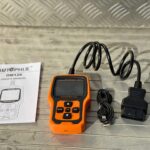Bluetooth OBD2 scanners have become indispensable tools for car enthusiasts and professional mechanics alike. Their convenience and affordability are undeniable, but when you delve into the market, you quickly realize not all Bluetooth OBD2 scanners are created equal. The key differences often lie beneath the surface, impacting functionality, reliability, and even the safety of your vehicle’s data. Understanding these distinctions is crucial before you invest in one of these devices.
One of the most significant areas of difference in Bluetooth OBD2 scanners comes down to the data they utilize. Reputable manufacturers, like Innova, operate as authentic data licensers of Original Equipment Manufacturer (OEM) information. This means they legally acquire access to the comprehensive and verified data directly from car manufacturers. This process ensures accuracy and compatibility, allowing their scanners to reliably interpret your vehicle’s diagnostic codes and provide trustworthy insights. This commitment to legitimate data sourcing, however, requires time and resources. OEMs typically release detailed data for their own expensive, dealership-level scan tools first, and only later make information available for aftermarket companies. This necessary lag can sometimes create the perception that legitimate scanners are “behind” in supporting the very latest vehicle models.
On the other end of the spectrum are less scrupulous scanner companies. To quickly offer updates and claim support for the newest vehicles, some resort to unethical practices. These companies may illegally access and “hack” OEM diagnostic software. They copy proprietary information and integrate it into their own, often cheaper, scanners. This shortcut allows them to push out updates faster, but it comes at a significant cost. The data obtained through hacking is not only legally questionable but also potentially incomplete, inaccurate, or even manipulated.
The risks associated with using these “hacked” scanners are considerable. Imagine relying on diagnostic information that’s based on reverse-engineered and potentially flawed data. This could lead to misdiagnosis, unnecessary repairs, and ongoing vehicle problems. Furthermore, manufacturers are actively combating these unethical practices. As highlighted by lawsuits against scanner companies for data theft, using a scanner with illegally obtained data puts you at risk. There’s a real possibility that a software update from the manufacturer could “brick” or render these compromised scanners useless.
In contrast, companies that prioritize legitimate data acquisition, while sometimes taking longer to release updates, offer a far more secure and reliable experience. They invest heavily in engineering and testing to properly interpret and implement OEM data for aftermarket tools. This meticulous process ensures that their Bluetooth OBD2 scanners provide accurate readings, function as intended, and won’t compromise your vehicle’s systems. While you might see some scanners boasting immediate support for the very latest models, remember that speed isn’t everything. When it comes to vehicle diagnostics, accuracy and reliability, built on a foundation of legally and ethically sourced data, are paramount. Choosing a Bluetooth OBD2 scanner from a reputable brand that values data integrity is an investment in the long-term health and proper maintenance of your vehicle.
